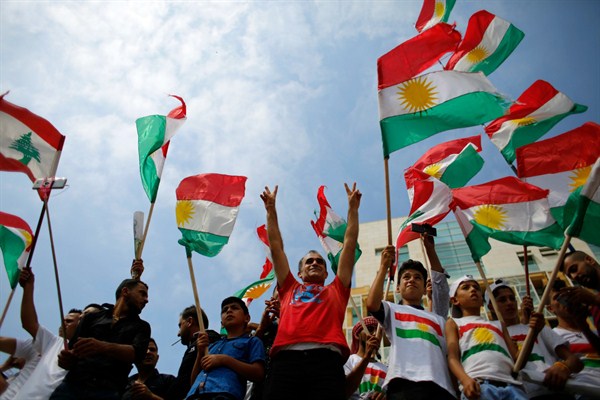Iraq’s semi-autonomous Kurdistan region made history this week by voting “yes” in a highly contested referendum on independence from the central government in Baghdad. While the poll is only one step in what is sure to be a long, fraught political process, it points to a broader push for autonomy by Kurds throughout the region, including in Turkey, Syria and Iran. With the self-proclaimed Islamic State in retreat and Syria’s war winding down, WPR has compiled 10 key readings on the buildup to the referendum and what comes next.
Purchase this special report as a Kindle e-book.
Road to the Referendum
Iraqi Kurdistan’s Economic Crisis Could Inflame Political Tensions
A year ago, Matthew Schweitzer highlighted the financial crisis facing Iraq’s Kurdistan region as oil production slowed, refineries fell offline and export quality dropped. The economic mess exacerbated widening divisions between Kurdistan’s main political parties, threatening to derail the national independence project.
How the Post-ISIS Vacuum in Iraq Will Test Relations Between Turkey and Iran
As the Iraqi army came closer to fully reconquering Mosul from the Islamic State earlier this year, questions began to emerge about the future balance of power, both within Iraq and in the wider region. Iyad Dakka analyzed in May how the quest for influence in Iraq could lead to tensions between Turkey and Iran, with the Kurds serving as important powerbrokers.
After the Liberation of Mosul, Where’s the Good News for Iraq?
The July defeat of the Islamic State in Mosul was supposed to be good news for Iraq. But any celebration of the city’s liberation was tempered with realism about the scale of the challenges ahead. Writing at the time, Ellen Laipson anticipated the complications posed by the Kurdish independence referendum in the context of the broader Iraqi transition.
Iraqi Kurds’ Independence Referendum Is a Lightning Rod for Broader Regional Conflict
In an email interview a few days before the referendum, Ramzy Mardini discussed how the vote might affect the continued international campaign against the Islamic State, the post-conflict state of affairs in Iraq and relations between the Kurds and regional and international powers.
Is Kurdish Independence From Iraq Impossible? Or Inevitable?
It’s easy to come up with many reasons for why the independence referendum was ill-advised, argued Ellen Laipson earlier this week. Yet while such criticism may be analytically true, it misses the larger point that the referendum is only a first step toward independence. Iraq’s Kurds have been emboldened to become masters of their own destiny, and this week’s vote is just one data point on a long trajectory.
Regional Aspirations
Kurds in Iraq, Turkey and Syria Vacillate Between Hope and Despair
The Syrian War and the rise of the Islamic State created the possibility for major changes to the political status of Kurdish minorities in Iraq, Turkey and Syria, with Kurds emerging as critical actors in providing security and stability. However, Müjge Küçükkeles explained in May 2016 that Kurds have yet to see their leaders translate military and political successes into a political project that addresses people’s priorities and needs.
Political Realities Leave Iran’s Kurds Divided, Weak and Ineffective
Iranian Kurds constitute about 8 to 10 percent of the country’s population. But in contrast to Kurds elsewhere in the region, they also tend to share a history and culture with the surrounding Persian majority. In an email interview in July 2016, Denise Natali discussed why geopolitical factors and a strong Iranian state have left Iranian Kurdish groups more ambivalent about autonomy than their neighboring counterparts.
Can Syria’s Kurds Leverage War Gains Into Political Autonomy?
The breakdown of the Syrian state has been a boon for Syria’s Kurdish groups, wrote Denise Natali in May 2016. Since 2011, they have made significant territorial, economic and political gains. A little more than a year ago, however, they were hampered by internal power struggles and a lack reliable long-term external support. As the war slowly winds down, how will these dynamics affect regional stability and Kurdish leverage in Syria?
After the Fall of Aleppo, Turkey’s Erdogan Digs In His Heels Against Syria’s Kurds
While Washington views Syria’s Kurdish groups as natural allies in the fight against the Islamic State, Ankara views them as a direct threat to national security and an extension of Turkey’s own Kurdistan Workers’ Party, or PKK. Iyad Dakka explained in January how Turkish President Recep Tayyip Erdogan has used political and military pressure to keep the Kurds boxed in until a lasting resolution to the Syrian crisis is negotiated.
With Attacks in Turkey, PKK Sends a Message to Erdogan—and to Trump
Two bombings last December in Turkey believed to have been carried out by an offshoot of the PKK were a grim reminder that Erdogan’s renewed military campaign has hardly broken Turkey’s Kurds. After the bombings, Hannes Cerny looked at how Donald Trump’s election in the U.S. and the ongoing war in Syria would affect the PKK’s prospects for autonomy.

